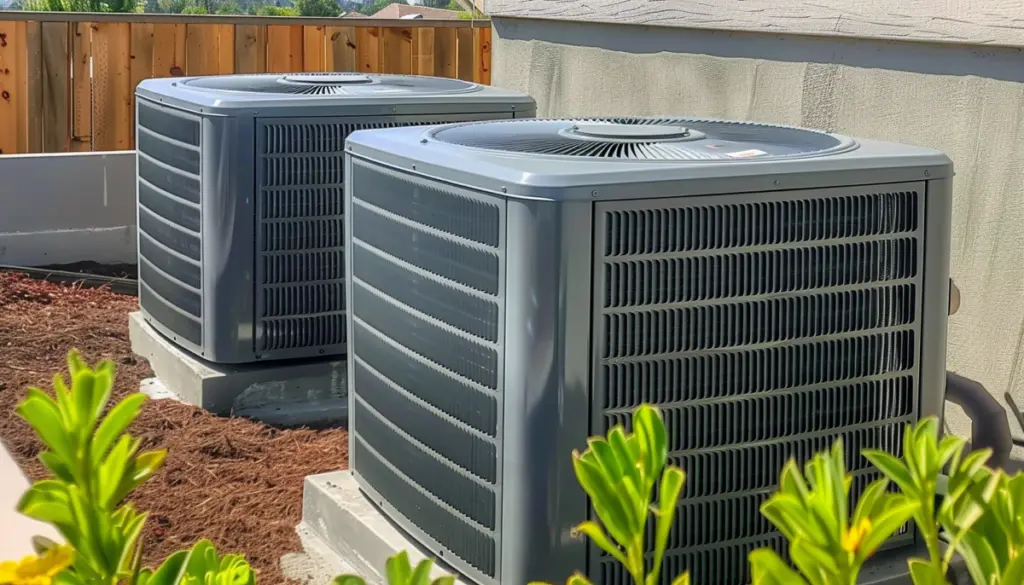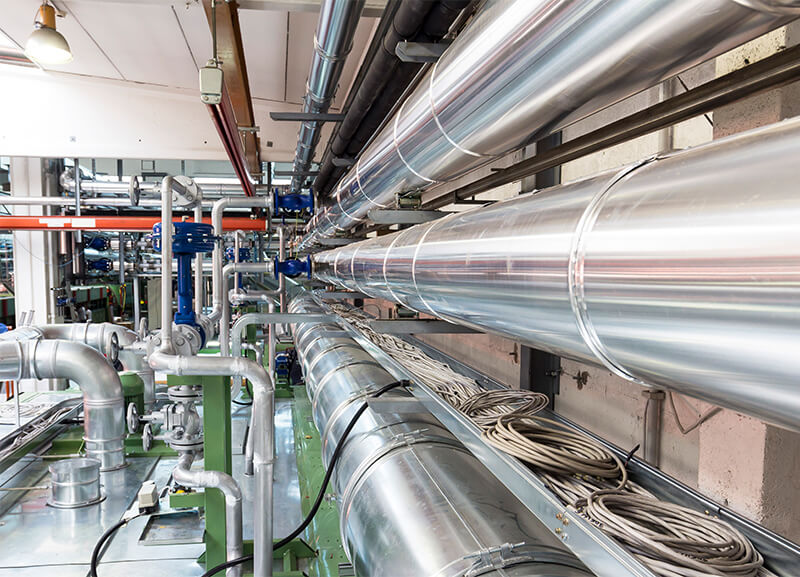Explore how HVAC experts provide same-day service options
Checking Out the Necessary Parts of an Efficient Heating And Cooling System
An effective HVAC system is developed on a number of critical parts that function in consistency. Each component, from the thermostat to the ductwork, plays an important role in maintaining convenience and energy efficiency. Recognizing these elements is vital for optimizing efficiency and boosting indoor air top quality. As one examines these components, the complex partnerships in between them disclose insights into improving total system performance. What details elements contribute most to this effectiveness?
The Function of the Thermostat in A/c Efficiency

Commonly neglected, the thermostat plays an essential function in the efficiency of HVAC systems. This small device acts as the key control center, controling temperature setups and making sure excellent comfort within a space. By accurately sensing the ambient temperature, the thermostat communicates with the heating, air, and air flow conditioning units to maintain the desired environment
An efficient thermostat decreases power consumption by activating the heating and cooling system only when essential, thereby avoiding extreme home heating or cooling. Modern programmable and wise thermostats improve this effectiveness better by enabling individuals to set schedules and remotely adjust setups, adjusting to day-to-day regimens.
The positioning of the thermostat is necessary; incorrect location can lead to imprecise temperature level analyses, resulting in ineffective procedure. On the whole, a well-functioning thermostat not just boosts convenience however also adds markedly to energy financial savings and the long life of the a/c system.
Recognizing the Value of Air Filters
Air filters offer a crucial function in HVAC systems by assuring that the air circulating within a space remains healthy and tidy. These filters trap dirt, irritants, and various other contaminants, avoiding them from being recirculated throughout the environment. By recording these particles, air filters add to boosted indoor air high quality, which can greatly profit residents' health and wellness, particularly those with allergic reactions or breathing problems.
In addition, maintaining tidy air filters boosts the performance of heating and cooling systems. Blocked filters can restrict airflow, triggering the system to function tougher to maintain wanted temperatures, leading to boosted power consumption and higher utility expenses. Routinely changing or cleansing filters is an essential upkeep action that can lengthen the lifespan of cooling and heating tools. Inevitably, recognizing the importance of air filters enables home owners and structure managers to take proactive steps to ensure a well-functioning, reliable HVAC system that advertises a comfy and safe interior setting.

The Performance of the Heater and Heatpump
Heaters and heatpump are vital elements of HVAC systems, in charge of giving heat during colder months. Heaters run by heating air through burning or electrical resistance, after that distributing it throughout the home using ducts. They generally use fast heating and can be fueled by natural gas, electricity, or oil, depending on the system kind.
Alternatively, warm pumps move warmth instead than produce it. They extract warm from the outdoors air or ground, also in low temperatures, and move it inside. HVAC experts. This double performance allows heatpump to additionally offer air conditioning in warmer months, making them versatile choices for year-round climate control
Both systems require correct maintenance to ensure performance and long life. While heaters master extreme chilly, heatpump can be helpful in modest environments. Comprehending their unique functionalities aids house owners in choosing one of the most appropriate choice for their heating requires.
Discovering the Air Conditioning Unit
The air conditioning unit is an important component of a/c systems, available in numerous types to fit different requirements. Understanding the efficiency rankings of these systems is essential for making educated selections about energy usage and cost. This section will certainly discover the diverse sorts of ac unit and make clear how effectiveness ratings influence performance.
Kinds of Air Conditioners
While numerous variables affect the selection of a/c systems, recognizing the various types offered is critical for home owners and structure supervisors alike. Central air conditioners are created to cool entire homes or structures, using a network of ducts for air movement. Home window devices provide an even more localized service, suitable for little areas or solitary rooms. Portable a/c provide flexibility, allowing individuals to move the unit as required. Ductless mini-split systems are one more choice, integrating the effectiveness of main systems with the ease of zoning, as they call for no ductwork. Finally, geothermal systems harness the planet's temperature for energy-efficient cooling. Each kind comes with distinct benefits, making informed selections vital for effective climate control.

Effectiveness Ratings Described
Recognizing performance scores is vital for selecting the ideal air conditioning system, as these metrics offer insight into the system's efficiency and energy usage. The most typical rating for ac system is the Seasonal Power Performance Ratio (SEER), which determines the cooling outcome during a regular cooling season separated by the overall electrical power input. A higher SEER suggests much better efficiency. Furthermore, the Energy Efficiency Proportion (EER) is made use of for measuring performance under details conditions. Another vital metric is the Energy Celebrity qualification, which signifies that an unit satisfies rigorous energy effectiveness guidelines. By reviewing these rankings, customers can make informed choices that not only maximize convenience but also decrease energy costs and environmental effect.
The Relevance of Ductwork and Air flow
Effective ductwork style and airflow management play essential roles in the total efficiency and performance of heating and cooling systems. Appropriate ductwork guarantees that conditioned air is dispersed uniformly throughout a space, lessening temperature level fluctuations and enhancing convenience. Well-designed air ducts minimize resistance to air flow, minimizing the workload on heating and cooling equipment and eventually lowering energy consumption.
Air movement monitoring involves strategically positioning vents and registers to enhance the flow of air. This stops common problems such as hot or cool places, which can happen when air movement is blocked or improperly well balanced. In addition, the appropriate duct products and insulation can better improve effectiveness by decreasing warm loss or gain throughout air transportation.
An effective ductwork system not only adds to energy financial savings however can likewise extend the life-span of cooling and heating tools by reducing unneeded strain (HVAC experts). Consequently, comprehending the relevance of ductwork and air movement is essential for accomplishing peak cooling and heating system performance
Routine Upkeep Practices to Improve Performance
Regular maintenance techniques are crucial for guaranteeing peak efficiency of HVAC systems. These practices consist of regular assessments, cleansing, and essential fixings to keep the system running efficiently. Routinely altering air filters is important, as stopped up filters can block airflow and minimize efficiency. Furthermore, service technicians should check and clean evaporator and condenser coils to avoid getting too hot and energy wastefulness.
Annual specialist inspections are also suggested, as qualified specialists can recognize possible issues before they escalate. Lubricating moving parts decreases wear and tear, adding to a longer life-span for the system. In addition, guaranteeing that the thermostat operates properly aids in maintaining ideal temperature level control.

Regularly Asked Questions
How Typically Should I Replace My Thermostat?
Thermostats should usually be changed every 5 to one decade, depending on use and innovation improvements. Routine checks are advisable to ensure peak performance, especially if experiencing inconsistent temperature level control or enhanced energy expenses.
What Size Air Filter Is Ideal for My Heating And Cooling System?
The most effective size air filter for a heating and cooling system varies by device layout. Generally, it's vital to speak with the proprietor's handbook or inspect the existing filter dimensions more info to guarantee peak performance and air top quality.
Can I Mount a Warmth Pump Myself?
Setting up a heatpump separately is possible for skilled individuals, but it calls for expertise of electric systems and neighborhood codes. Working with a professional is suggested to ensure correct installment and optimal system efficiency.
Just how Do I Know if My Ductwork Is Reliable?
To establish ductwork performance, one should examine for leaks, action air movement at vents, inspect insulation top quality, and evaluate temperature level differences between supply and return air ducts. Expert assessments can supply comprehensive understandings into overall performance.
What Are Indications My A/c Requirements Immediate Maintenance?
Indications that a HVAC system needs prompt maintenance consist of uncommon noises, inconsistent temperature levels, raised power bills, undesirable odors, and constant cycling. Resolving these issues without delay can stop additional damage and assurance optimal system performance.
Air filters offer a necessary function in HVAC systems by assuring that the air flowing within a room continues to be clean and healthy and balanced. Furthermore, keeping tidy air filters enhances the performance of Heating and cooling systems. Ductless mini-split systems are one more alternative, incorporating the efficiency of main systems with the convenience of zoning, as they need no ductwork. Comprehending effectiveness rankings is important for choosing the best air conditioning unit, as these metrics give understanding into the system's efficiency and power consumption. The best size air filter for an A/c system varies by device style.